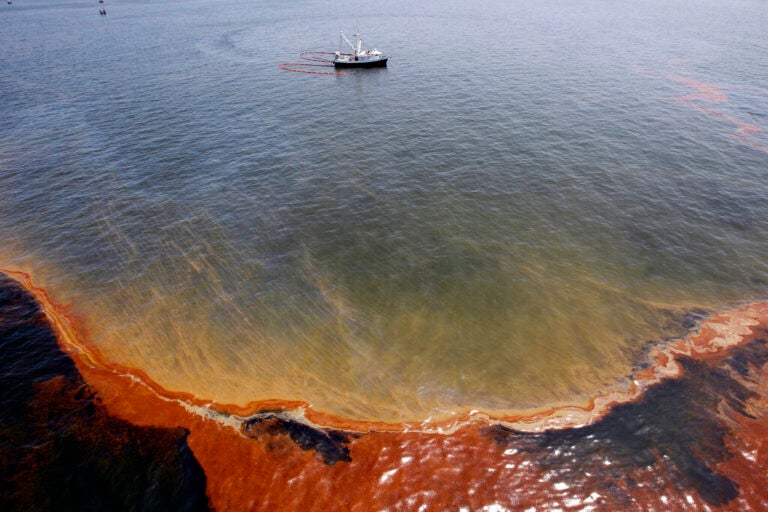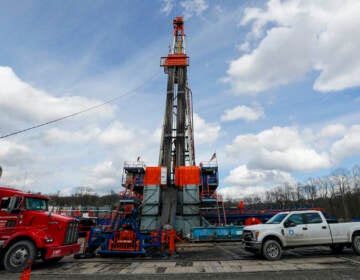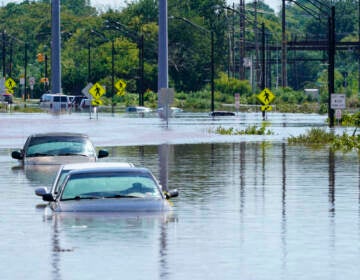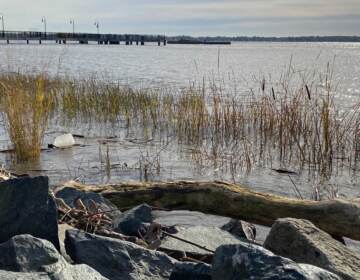Climate change attorneys say a Pa. statute could be used to prosecute fossil fuel companies
A new law journal article argues climate polluters could be criminally charged in Pennsylvania. But some say it’s a risky long shot for prosecutors.
Listen 2:01
FILE - This Wednesday, May 5, 2010 file picture shows a plume of oil as a shrimp boat uses booms to collect oil in the waters of Chandeleur Sound, La. On April 20, 2010, a well blew wild under a BP oil platform in the Gulf of Mexico. Eleven workers were missing that day, and would later be declared dead. Ten years after the explosion on that Deepwater Horizon rig off Louisiana's coast, The Associated Press is making the original story and photographs available. (AP Photo/Eric Gay)
This story is part of the WHYY News Climate Desk, bringing you news and solutions for our changing region.
From the Poconos to the Jersey Shore to the mouth of the Delaware Bay, what do you want to know about climate change? What would you like us to cover? Get in touch.
Could climate polluters face criminal charges in Pennsylvania for causing or risking a catastrophe? A new article published this month in the New York University Environmental Law Journal highlights a Pennsylvania statute that could be used as a unique legal strategy to hold large emitters of carbon dioxide accountable. But several lawyers say it could be a tough sell to prosecutors.
More than 2,000 legal cases related to climate change have been filed nationwide, including a lawsuit filed in March by Bucks County against BP. A landmark case decided in December by the Montana Supreme Court ruled the state was violating residents’ constitutional rights to a clean environment by not taking into account the impact of greenhouse gas emissions when permitting fossil fuel operations. None of these thousands of lawsuits filed in state, local and federal courts, however, cite criminal statutes.
But the NYU law journal article, “Causing or Risking Climate Catastrophe,” relies on Pennsylvania’s criminal statutes and draws from a criminal case brought against the owner and manager of a nightclub on Pier 34 in Philadelphia, which collapsed into the Delaware River killing three women and injuring more than 40 people in 2000.
“It’s a novel approach,” said Aaron Regunberg, co-author of the article and head of the climate accountability program at the nonprofit Public Citizen. “We think it’s really appropriate and fits in well with the role of what prosecutors are supposed to do to seek justice for the victims of climate disasters and to proactively try to avoid these catastrophes moving forward.”
The criminal statute Regunberg said applies is causing or risking a catastrophe, which is a second or third-degree felony in Pennsylvania. It’s also a crime in five other states, including New Jersey. The authors chose to write about Pennsylvania because it has solid case law to support it, Regunberg said.
“Obviously it’s not new to prosecute corporations even for charges like homicide,” Regunberg said.
The Department of Justice charged BP with criminal offenses for the 2010 Deepwater Horizon oil rig explosion, for example. But criminal charges for companies that have emitted C02, while knowing the consequences would be “catastrophic” may still be unused because of impracticalities and obstacles, according to several litigators who reviewed but did not participate in writing the law review article.
Still, Regunberg said they have been discussing the possibility with a number of county prosecutors and state Attorneys General.
“We need to be exploring every strategy that could help keep our community safe and seek justice for the folks who have been harmed by this crisis,” said Regunberg. “We have these criminal statutes that are untapped.”
“[Fossil fuel companies] have long understood — with shocking accuracy — that their fossil fuel products would cause, in their own words, ‘globally catastrophic’ climate change,” reads the article. “Instead of changing their business model, alerting the public, or even acquiescing in solutions, FFCs concealed what they knew and executed a multi-million dollar disinformation campaign to spread doubt about climate science.”
A spokesperson for the American Petroleum Institute said in an email that the industry has worked for the past two decades on achieving “its goal of providing affordable, reliable American energy to U.S. consumers while substantially reducing emissions and our environmental footprint. Our industry will remain focused on that important work, notwithstanding these kinds of unserious distractions.”
A journal article from 2023 published in Science tracked internal documents that have since come to light, showing Exxon predicted the impacts of climate change decades ago.
“The victims of these climate disasters deserve justice in the same way, a victim of any sort of street level crime deserves it,” Regunberg said. “They are the result of specific decisions made by specific corporations and CEOs that knew the likely effects of those decisions and went ahead and did it anyway in order to keep increasing their profits and they’ve made out like bandits and they’ve left all the rest of us to pay the price and if that’s not what a statute against causing or risking catastrophe is for, we don’t know what it is.”
A legal theory with a lot of questions
“There’s not a prosecutor in the country who would take this on,” said Seth Weber, a retired assistant U.S. attorney who led efforts to investigate criminal conduct by Energy Transfer regarding the construction of the Mariner East pipeline project in Chester County.
“Who is going to prosecute this case? Is it going to be a county DA’s office that has DUIs, rapes, murders, assaults, burglaries, robberies, drug trafficking crimes, sex trafficking crimes? Where are the resources going to come from to even investigate and prosecute that case?”
Weber, who teaches at DeSales University in Center Valley, Pennsylvania, has tried more than 150 jury trials, including environmental crimes. He says Pennsylvania has a law that prohibits criminal prosecution of companies unless it’s deemed serious, and there’s a smoking gun pointing to executives — something he learned during the Mariner East investigation. The Pennsylvania Attorney General did end up criminally charging Energy Transfer, in part by using some of the evidence gathered by Chester County prosecutors, but Weber said the company “had to agree to it” as part of a settlement.
Regunberg said the evidence also exists to charge individual executives, should a prosecutor choose to pursue a case.
But Weber said that’s unlikely, especially since the reason the majority of environmental cases are civil and not criminal, is because a criminal charge has a much higher bar. It requires proof beyond a reasonable doubt, while a case brought under civil statutes requires just the preponderance of evidence.
“Why would a prosecutor prosecute a climate change case against a fossil fuel company using a criminal statute when, if you want to punish them, it’s all about the dollars?” Weber said. “You can’t put Exxon in jail. You can’t put any of the other major greenhouse gas emissions companies in jail. You cannot put a corporation or business organization in jail. No one is going to jail. So forget about deterrence. Why get a higher burden of proof when you can go after them civilly and get the lower preponderance of the evidence standard?”
Weber also said since the carbon emissions began decades ago, and are now having an impact, it brings up statutes of limitation.
“Can you imagine waiting 50 years to prosecute a robbery?” he said.
The authors of the law review article argue a conspiracy charge could be a way to avoid the statute of limitations. And they agree that the fossil fuel industry would bring a lot more resources to the table than any local prosecutor could.
“This is an industry that makes trillions of dollars. And so for a prosecutor’s office to take on an industry of this size with these financial resources and this kind of political power is going to be risky for them,” said Donald Braman, a criminal law professor at George Washington University and co-author of the piece.
While Braman agrees it would be difficult to take on as a prosecutor, he said that could change as more young people move into positions of influence.
“As the catastrophes escalate and as young people who face their entire future in an environment dominated by increasing climate harms, [and] start to join the jury pool, start to become prosecutors, start to become judges and start to become shareholders, I think that the writing’s on the wall,” Braman said, “and I hope that everybody, including everyone inside fossil fuel companies, starts to pay attention to that.”
But Weber said prosecutors would still have to convince a judge or jury to convict beyond a reasonable doubt.
Fossil fuel companies have permits to conduct their business, essentially government permission to do what they are doing, another way for the company to defend itself in court.
If the companies are charged and convicted of risking or causing a catastrophe, the fines are in the range of $15,000 to $25,000 per count, Weber said.
“Is that going to deter a multimillion dollar company? Is that going to interfere with the operation of their business and the money that they’re making? I don’t think so,” Weber said. “I mean, did Energy Transfer go out of business by that criminal prosecution?”
“Maybe you put the CEO in jail,” Weber said. “And do you think that the other fossil fuel companies are going to say, ‘That guy went to jail, so we shouldn’t do what we’re doing anymore’? No, they’re going to do what drug dealers do. Drug dealers say, ‘Well, that guy got caught for drug dealing because he’s stupid. We’re not stupid.’”
‘Win by losing’
Environmental attorney Rich Raiders said there are a lot of questions with the strategy, but says the article does serve an important purpose.
“The idea behind these articles isn’t necessarily to come to an answer, but to get people to start thinking about how to address a question. And in that respect, it does that and it does it well,” Raiders said.
Raiders represented homeowners who sued Energy Transfer over the Mariner East pipeline construction. He said a case like this would be a battle of the experts, but there are fundamental questions the article does not address about whether the charges would stick.
“What do you have to show responsible for climate change to meet the definition of a catastrophe?” Raiders said. “What is that level of threshold that you have to show before you can write a complaint that actually can survive objections? And how do you prove that it was the fossil fuel emissions caused by the marketing aspects of these companies to get you far enough that you can meet this definition? We don’t know.”
Raiders said the goal of this type of prosecution could be to get a large settlement, similar to what happened with the tobacco companies settlement or a previously proposed Sackler family settlement over opioids.
In that case, it makes sense to bring a case where you “win by losing.”
“And maybe that’s what a case like this does. It’s not necessarily to win the case, but it’s to move the needle,” Raiders said.
For example, he said it could get the legislature to take action. But it also requires someone willing to lose.
“I think this is an interesting discussion in the long term for how to get people to think about the problem,” Raiders said. “And as a thought piece it does have some merit. But will you see something like that filed in the next 12 months? No, not anytime soon.”
Braman, one of the co-authors of the piece, is more optimistic.
“We desperately need some kind of solution that will allow the public to hold these massive corporate criminal actors accountable and have them really address the harms that they’re generating,” he said.

Get daily updates from WHYY News!
WHYY is your source for fact-based, in-depth journalism and information. As a nonprofit organization, we rely on financial support from readers like you. Please give today.







